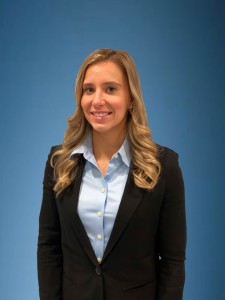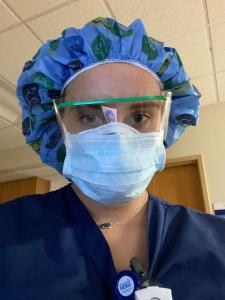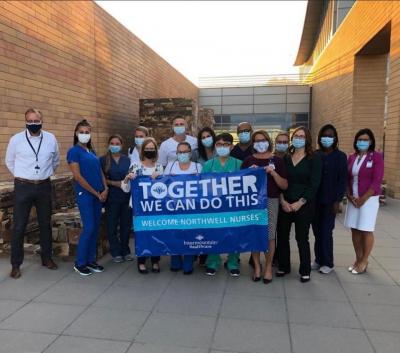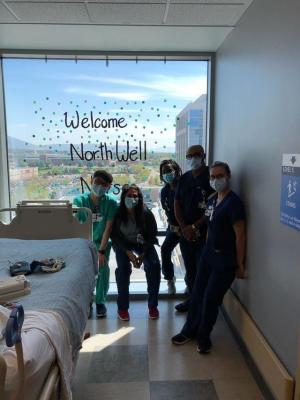My journey on the front lines

 Kristi Leicht earned her BSN from the U-M School of Nursing in 2017. Over the last year, she has been on the front lines of the COVID-19 pandemic in an adult surgical intensive care unit at a hospital just outside of New York City. She took the time to share her experiences as a young nurse living and learning through one of the most difficult challenges she has ever faced.
Kristi Leicht earned her BSN from the U-M School of Nursing in 2017. Over the last year, she has been on the front lines of the COVID-19 pandemic in an adult surgical intensive care unit at a hospital just outside of New York City. She took the time to share her experiences as a young nurse living and learning through one of the most difficult challenges she has ever faced.
Both my mom and grandmother were nurses, so becoming a nurse was an easy choice for me. Because of them, I was exposed to the medical field at an early age. I knew I wanted to become a surgical ICU nurse after my critical care rotation in the post-anesthesia care unit my senior year at U-M. I enjoyed the fast-paced environment and critical thinking skills I developed there.
When the COVID-19 outbreak hit my hospital, it didn’t seem real, and I often had to remind myself this was not a dream. It started with one COVID ICU unit and quickly escalated to eight units. In addition to staffing these units, my unit carried the rapid response pager. The pager would alarm when any of the non-ICU units had a patient whose status was declining and potentially needed ICU care. One night while carrying the pager, I handled 14 rapid responses in the hospital during a 12-hour shift. For each one, we had to decide if the patient was going to be intubated, call family to change their code status, or implement one more treatment that would delay them entering the ICU.
The actual COVID ICUs were a nightmare. One nurse was in charge of caring for at least three patients, when under normal circumstances our ratios are either 1-to-1 or 2-to-1. We were also working with different doctors every night from a range of specialties — some with very little ICU experience. Ultimately, we were so busy caring for some of the sickest patients I had ever seen that we spent 12 hours on our feet in full PPE, rarely taking a break. On the worst night, my hospital had so many deaths we ran out of body bags. We also ran out of Propofol and Nimbex, two medications we used in high doses to sedate patients.
The one thought that constantly went through my head was “If my Dad could get through 9/11, I can do this.” My dad, now retired, was a New York City firefighter who worked through 9/11 and the many months after cleaning up ground zero. He told me stories of working 24-hour shifts, taking naps on the street and finding limbs caught between pieces of steel. Driving in to Manhattan at 7 p.m. and listening to everyone cheering and banging their pots and pans also helped me stay positive. It was incredible hearing that support from the entire city. Ultimately, I knew I was learning a lot fast, and I was on the front lines of a moment in time that would be written about in the history books. With all of that, the emotional aspect of the pandemic did not really hit until later on when cases declined and I wasn’t working every shift in a COVID unit.
In August, I took the opportunity to travel to Intermountain State Hospital in Utah with other coworkers to help in their COVID ICU. I always wanted to go on a medical mission trip, so when I received the email about my hospital system sending ICU nurses to Utah, I responded immediately, knowing this could finally be my opportunity. At first it was a little scary, and I questioned what I got myself  into. Their charting system was completely different, and we only had a two-hour crash course to learn it. Utah was experiencing a small spike in cases, and the hospital wanted to train their nurses in ECMO, so we were filling the gaps. At the time, they only had about 14 COVID ICU patients, and I was floated to all of the ICUs in the hospital. I’ve heard after we left the hospitalizations were much worse, so it was a little frustrating knowing that we were there at the wrong time. The highlight of my trip was meeting ICU nurses around my age from other hospitals in the system and listening to their own experiences during the peak of the pandemic.
into. Their charting system was completely different, and we only had a two-hour crash course to learn it. Utah was experiencing a small spike in cases, and the hospital wanted to train their nurses in ECMO, so we were filling the gaps. At the time, they only had about 14 COVID ICU patients, and I was floated to all of the ICUs in the hospital. I’ve heard after we left the hospitalizations were much worse, so it was a little frustrating knowing that we were there at the wrong time. The highlight of my trip was meeting ICU nurses around my age from other hospitals in the system and listening to their own experiences during the peak of the pandemic.
In March and April at the worst moments of the outbreak, I felt like health care workers were being showered with gratitude and compassion from the community. Then during the summer, the state’s attitude toward the pandemic and how the government was handling it flipped. It seemed like health care workers were put in a different light. I felt and still feel like I’m arguing to prove to people how badly COVID-19 can affect the human body and what hospitals went through during the peak of the pandemic. One morning, I was leaving my hospital’s parking lot and found an “X” spray-painted over a health care heroes sign.
So far, the second wave has been nothing compared to what we went through in March and April. Our hospital system is also doing a good job of spreading out the COVID patients so one hospital won’t get overwhelmed … but I don’t want to jinx anything yet.
Right now we’re in a unique time that I don’t think will last forever. Although the past year has been difficult, I learned A LOT, and I don’t have a single regret about going into nursing.





